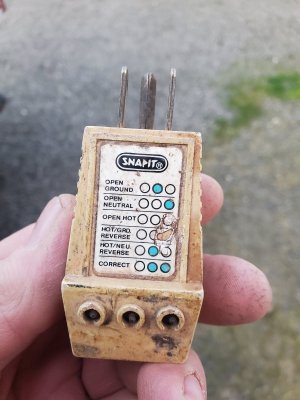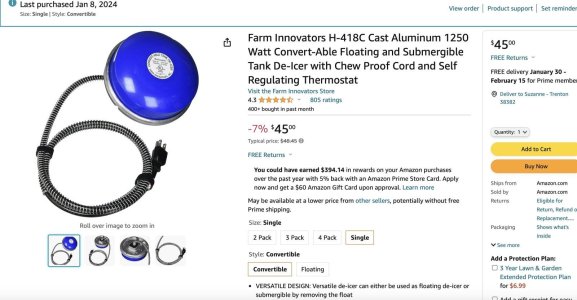I have three troughs that I need to keep thawed out this week and have water heaters that I put in the base that seems to work just fine. Of course the instructions say, so not put on an extension cord. Well crap! All three must be on extension cords.
Seems Joe, the horse, when he goes to the trough, he cannot drink out of his because of the heater. I unplug it, and he can drink. Is there a current still running into the water if that plug from the water heater is not directly grounded at the tank? If so, is there a device that can be purchased, that can be hammered into the ground that the extension cord can be plugged into, and then the water heater be plugged into because you can ground out that new post that has a grounding rod in it?
It the fact is is not a solid ground at the plug in the problem?? I can picture a post with a plug in and out, with a copper rod to drive down to cure the grounding problem. Then maybe I am dreaming......
I don't know how to type the name of what I am looking for to make it show up anywhere like at Lowes or a hardware store. Or would this correct the problem? I was told that a horse can sense a charge in water where as a cow is not so sensitive. I see nothing wrong with the heater.
Seems Joe, the horse, when he goes to the trough, he cannot drink out of his because of the heater. I unplug it, and he can drink. Is there a current still running into the water if that plug from the water heater is not directly grounded at the tank? If so, is there a device that can be purchased, that can be hammered into the ground that the extension cord can be plugged into, and then the water heater be plugged into because you can ground out that new post that has a grounding rod in it?
It the fact is is not a solid ground at the plug in the problem?? I can picture a post with a plug in and out, with a copper rod to drive down to cure the grounding problem. Then maybe I am dreaming......
I don't know how to type the name of what I am looking for to make it show up anywhere like at Lowes or a hardware store. Or would this correct the problem? I was told that a horse can sense a charge in water where as a cow is not so sensitive. I see nothing wrong with the heater.


